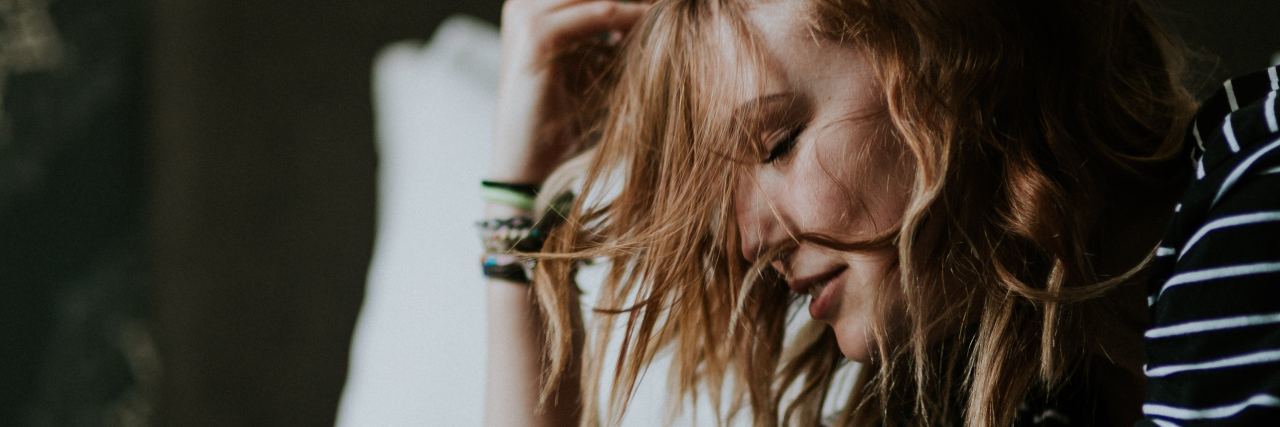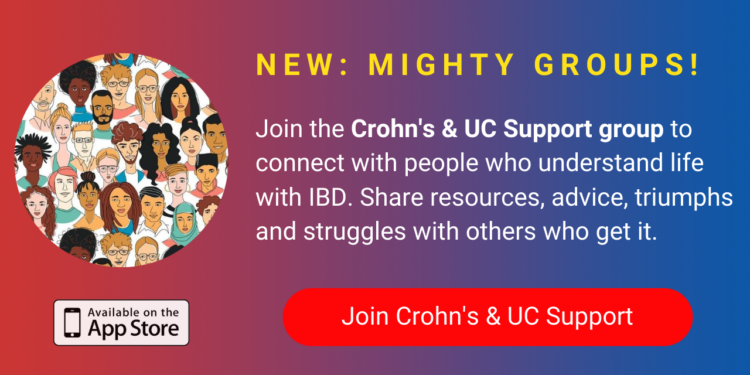Knowing I’d be hitting double digits since my diagnosis with Crohn’s disease has caused me to spend a lot of time reflecting over the past few months. After spending so many years focused on getting to a future that was bright and disease-free, it’s a little weird to look back at the journey. Along the way, I’ve experienced fear, sadness, anger and pain, along with determination, personal growth and a constantly fluctuating battle between finding peace with my diagnosis and a nagging desire to be “normal” (whatever that is). Now that a decade has come to a close on managing this disease, I’ve found that these are the top five things I’ve learned along the way:
1. I can reach personal goals and live successfully with Crohn’s disease.
First and foremost, I’ve learned that I truly can take on new challenges and accomplish goals while managing this disease. But, it hasn’t always gone how I’d hoped it would. To make things happen, I needed to completely change my tactics on how I defined and approached goals. Two major themes for success have played out: I’ve needed to build in very flexible expectations for myself, and I must focus on gradual progress as a measure of success if I want to keep my spirits up along the way. I’ve been able to hike and travel again – a personal goal I set from the start – but, I had to learn to love smaller hikes (and sometimes just simple walks around the block) and domestic travel at times when I’m not well. I’ve needed to accept “two steps forward, one step back” as progress made, and I’ve needed to remind myself that breaks in progress are not failures as long as I know that I’ll try again as soon as I’m able. As a result of this approach to goal-setting over the past decade, I was able to get married, have children, go to grad school, develop a love of public speaking and advocacy, and am now embarking on a new career in healthcare.
2. I cannot control this disease.
Try as I might – and oh, how I’ve tried – I’m not in control of this disease. I like to make contingency plans for the management of symptoms of all sorts, but as soon as I think that things are figured out, some new manifestation of symptoms comes along which blows my contingency plan to smithereens. At first, this was the single hardest thing for my type-A brain to accept about Crohn’s. I had to be in control. Well, I’m not. I’m smart, savvy and capable. At times, I feel like the MacGyver of managing symptoms. But I’m not in total control of this disease. I can’t decided how and when symptoms appear. I’m ever-ready for them, but I don’t have a Crohn’s disease crystal ball. Accepting this fact has been huge in how I mentally manage my journey with this disease. As corny as it may sound, what I am in control of is how I accept this disease… which is and will always be a work in progress.
I’d also be remiss if I didn’t mention that I have control over how I work with my clinician to manage this disease. Realizing that I can (and should!) partner with my doctor to have some measure of control over how we make treatment decisions has been invaluable as we continue to review treatment approaches together to set and reach goals. While the disease itself may not be totally controllable, smart disease management may help coax the disease to remission. Optimizing my doctor’s ability to manage the disease through treatment requires my participation in treatment decisions and external lifestyle factors that may at least try to tame the beast.
3. Remission isn’t what I expected.
I needed a blood test, scope and MRI to confirm that I was in remission before I would believe it. Even afterwards, I was mad in some ways. Why wasn’t I feeling as good as I had when I was 20 and running around my college campus, before the disease first appeared? I really had to talk myself through the way that age, chronic inflammation, depleted nutrition, the mental anguish of disease and the resulting scar tissue would change my body forever. Remission has never been what I expected. It’s even more confusing for those around me. If I’m in remission, why am I still tired from time to time? If I’m in remission, why are some days… off? For anyone else feeling let down by remission, I’m with you. The personal journey to accept, appreciate, manage and maximize remission has been just as involved in some ways as the journey to manage active disease.
4. This life-long experience is best when shared with others who “get it.”
For years, I had a handful of friends who really knew what I was dealing with. There were many aspects of the disease I mentioned to no one. Managing disease meant hours of solitude in a bed with my best friend, Netflix. When I mention shows I’ve seen over the years, I’m occasionally told “wow, you watch a lot of TV,” which stings as a little reminder that so much of this battle is had alone. Over the past few years, though, my circle of friends with Crohn’s has grown to a satisfying group that brings such joy and humor to many aspects of day-to-day life with the disease. When I’m let down, scared or depleted, they lift me up. And when I can be an ear or offer some advice, some of my experience seems worth it.
5. Overcoming disease-related challenges has forever changed who I am for the better.
This last point has been my most recently appreciated and hard-fought lesson with the disease. For years, friends have commented that I manage the disease well, and others who know nothing of my health have mentioned that I’m an “old soul” or that I seem to have good “life perspective.” While this may be true in some ways, I’ve fought the notion that any aspect of this disease could have possibly brought a positive change in me, as if I would have been a different person if I didn’t have the disease… but it’s true.
A part of me still hates saying this because I do not want to have this disease. If a magic pill would make me disease-free forever tomorrow, I would take it. Hands down. I hate the thought of this illness sidelining me from taking care of my kids, getting to work and being with family and friends. But I look back on my ability to be kind and patient with myself. I think about the fact that I am incredibly open to admitting that I know nothing of what others challenge every day. I think about the way that life obstacles don’t seem insurmountable anymore. And sure, some of that perspective will come with age, but a lot of it has come as a result of the fact that I had to find perspective to live and thrive as a result of this disease. I had no choice. I’ve learned a level of strength I never knew I had within myself. I’ve learned humility. I’ve learned to be humble. I’ve learned to laugh at myself. I’ve learned to accept what I cannot control. This disease has inspired me to give more to the world than I take from it. Simply put. Because as a result of this disease I know what it feels like when it seems like the world has dealt me a bad hand. That perspective has given back to my life in a positive way that no other lesson or life experience possibly could.
Cheers to the next 10 years and the lessons that await me!
This story originally appeared on Chronically Jess.


